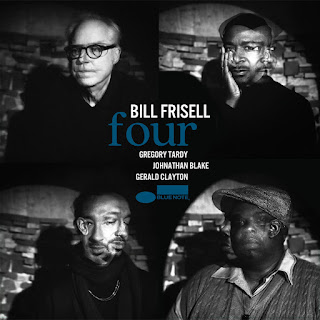Bill Frisell is a shy star. At the end of the 1970s and the beginning of the 80s, he appeared on the scene with his very quiet sounds, which in their apparent hesitation, their pausing and patient gathering unfolded an energy all of their own: Wide-screen soundscapes, whispered. Frisell had a unique voice, completely different from anything familiar. You might say: he is a chamber musician of jazz. And we’ve been lucky enough to hear this voice on hundreds of albums.
But due to the COVID pandemic Frisell couldn’t do what he actually loves best for two years: playing concerts and recording music in the studio. He was thrown back on himself. However, he was able to reflect on his situation in a positive way: “I'm so happy that I’m still in love with my instrument. That’s probably what got me through this time now, too. I said to myself, okay, I have all day now. So I’m going to take my guitar and play. There was no goal, no deadline, nothing like that, it was just the joy of playing whatever came to my mind,“ he said in an interview with Bayrischer Rundfunk on the occasion of his 70th birthday.
Now, after two years, he is back with a new album on which he has musically processed his impressions and experiences of this time. Four, his third Blue Note album, is about loss, renewal and friendship. Within a short time, Frisell lost three longtime, very close friends, to whom he now pays his last respects, so to speak: “Dear Old Friend“ is dedicated to his childhood friend Alan Woodward, whom he knew even before he picked up a guitar for the first time. With "Claude Utley" he recalls the Seattle-born painter, and “Waltz For Hal Willner“ is a tribute to one of jazz’s most inventive producers.
Frisell recorded Four with a new quartet: Saxophonist and clarinetist Greg Tardy, pianist Gerald Clayton and drummer Johnathan Blake. He had never played with them in this constellation before, yet they present themselves as a strong harmonic and melodic unit. Frisell had jotted down many melodies and compositional ideas from quarantine and brought them to the sessions, but laying out little more than musical sketches for his fellow musicians, he motivated them to improvise. "Nothing was really planned down to the last detail," he says. "Everyone just had the information I gave them. But it was absolutely open-ended as to who would play what and when.“ Despite this improvisational freedom, however, they always stayed true to the original idea of each song. Only rarely does one step into the spotlight alone. Four consists entirely of original compositions, most of them written during the lockdown (others are reinterpretations of songs that can be found on Good Dog, Happy Man and Lookout for Hope).
The result is a jazzy album that is less in the tradition of Good Dog, Happy Man or Nashville than in that of Circuit Rider, his collaboration with Ron Miles and Brian Blade. Still, the Great American Songbook shines through in the music again and again, e.g. “Dear Old Friend“ is reminiscent of “Swing Low, Sweet Chariot“ and “The Pioneers“ of Hank Williams’s “I'm So Lonesome I Could Cry“. The latter is perhaps the best way to see how Frisell brings together the two great American musical styles - jazz and country. Whereas the song was a relatively straight folk rocker on Good Dog Happy Man, here it’s a mélange of relaxed swing (largely because of Hardy’s saxophone) and Frisell’s crystal-clear arpeggios that exude typical Southern country music charm. But Four also offers something for fans of more adventurous structures. “Dog On A Roof,” the last song on the album, starts out still quite melodic but slides very quickly into gloomy, weird realms. Frisell’s harmonics meet fragmentary saxophone lines, the drums stop playing time and the piano is limited to a few dark chords. Finally, the piece drags toward its conclusion in a tough and heavy groove.
It's great to see that this unique, wonderful voice is back after a short break. Hopefully nothing will hold him back from live performances and studio recordings in the near future.
Four is available on double vinyl, as a CD and as a download.
Listen to “The Pioneers“ here:














8 comments:
An excellent and perceptive review, Martin; thank you.
Thank you for the nice words, Philip.
This is an album that I’ve had a tough time getting into. I own almost all of Frisell’s albums but this one misses the mark for me. I long for the days of Gone, Just Like a Train and Blues Dream. However, your review moved me to take another listen.
This is an album that I’ve had a tough time getting into. I own almost all of Frisell’s albums but this one misses the mark for me. I long for the days of Gone, Just Like a Train and Blues Dream. However, your review moved me to take another listen.
I honestly felt the same way. I couldn't get much out of the album at first, but I listened to it again and again and then finally found an approach. In the meantime I like it a lot. But if he made an album like Gone, Just Like A Train again, I would be happy about that, too.
Martin, do you have Angel Song by Kenny Wheeler? It's one of my favorite performances of Frisell. Simply sublime!
Martin, do you have Angel Song by Kenny Wheeler? It's one of my favorite performances of Frisell. Simply sublime!
Dear Robert, I do have the CD. It's one of my top 3 album with Bill Frisell. :-)
Post a Comment